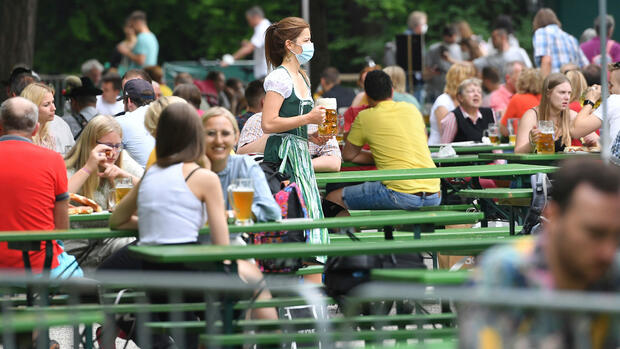Dehoga fears that the company will die if the VAT rate is increased again.
(Photo: picture alliance / SVEN SIMON)
Berlin In the traffic light coalition, demands are being made to permanently continue the reduced VAT rate for food in the catering trade. “Even if the catering industry is back at around 90 percent of its sales before Corona, I am in favor of maintaining the reduced tax rate,” said the co-head of the SPD-Left, Sebastian Roloff, the Handelsblatt. The reduced sales tax revenue of a good 3.3 billion euros annually from 2024 would then have to be generated elsewhere.
Out of consideration for the industry, FDP parliamentary group leader Christian Dürr also believes that the VAT reduction should be extended. “The return to the full sentence would also affect small and medium-sized restaurants very much,” he said on Tuesday in an interview with the editorial network Germany (RND). “It’s just a matter of setting the priorities correctly.” The Union had positioned itself similarly, pointing out the uncertainty of many companies.
During the corona pandemic, the grand coalition decided to temporarily reduce VAT in the catering sector in order to help companies through the crisis. Shortly before the summer break, the traffic light factions in the responsible finance committee of the Bundestag rejected a reduction in VAT beyond this year.
The hotel and restaurant association Dehoga named the number of 12,000 company closures if VAT of 19 instead of the current seven percent had to be withheld. The association spoke of “existential fears” that were increasing in the catering and hotel industry.
An increase in VAT from 2024 would be “a catastrophe with fatal consequences” for companies, guests and the tourism industry in Germany, said Dehoga President Guido Zöllick. As evidence, he referred to a survey of around 9,600 member companies. According to this, almost 96 percent of entrepreneurs said that they would increase their prices if the reduction in VAT was not extended.
Economists against permanent relief of gastronomy
Against this background, the SPD politician Roloff fears that price developments could accelerate further. The price increases that are significant in many places, with consequences for consumers and guests, “we would only heat up,” he warned. “So a return to the higher tax rate would be inflationary to some extent.”
However, leading economists do not believe in permanently extending the existing reduced VAT rate for restaurant and catering services. “The tax cut was a measure taken during the pandemic to support the catering industry, which was hit by the crisis,” said the President of the Munich Ifo Institute, Clemens Fuest, the Handelsblatt. “The pandemic is long gone, so the relief effort should end.”
The President of the German Institute for Economic Research (DIW), Marcel Fratzscher, sees no need to implement the temporary VAT reduction permanently. “During the corona pandemic, the catering industry was hit particularly hard by the closures and the reduction in VAT was therefore justified,” he said.
“But in the current situation, there is no good reason why the catering trade should permanently benefit from a VAT reduction, while other sectors such as hotels or retail shops do not.” The economic and energy crisis makes it necessary to end this “preferential treatment of the catering trade”. , since the state has to make savings.
Also read: Every fourth small business owner is thinking about quitting
Fratzscher considers an increase in prices as a result of the higher VAT to be manageable. Gastronomy has “already increased prices very significantly in recent years, so my guess is that prices will only increase slightly,” said the DIW boss. He also assumes that the economic recovery will also significantly strengthen demand for the catering trade, “which should roughly compensate for the increase in VAT”.
Ifo boss Fuest also expects an inflationary effect. “The VAT increase would probably be partly passed on to higher prices, partly it would have to be borne by companies,” he said. “That would increase inflation slightly.” If that’s the concern, you could reduce the general VAT by one point from the current 19 percentage points. In principle, however, uniform sales tax rates are correct.
More: Tim Mälzer talks about staff shortages, inflation and the pandemic
